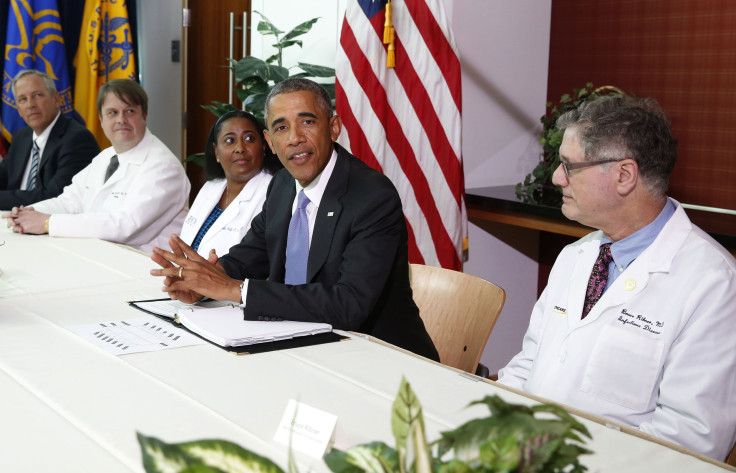Obama Ebola Statement: US Will Send Troops To Liberia To Combat 'Potential Threat To Global Security'

The United States will send around 3,000 U.S. troops to Liberia to help combat what health officials call the deadliest Ebola outbreak in history. President Barack Obama has called on Congress to approve additional funding to combat the epidemic, which he described as "a potential threat to global security” in a televised statement Tuesday.
At the request of the Liberian government, the U.S. will set up a military command center in the country’s capital that would serve as a base to support countries across the region, Obama said in a speech Tuesday from the Centers for Disease Control and Prevention, or CDC, in Atlanta. The U.S. will also set up new training facilities, medical facilities and an air bridge, he added, that will facilitate quicker entry into the country of both medical personnel and supplies.
The 3,000 U.S. troops will be working with local health officials on the ground to build an additional 17 treatment centers around Liberia. Each center will have 100 beds.
“This is the largest international response in the history of the CDC,” Obama said. “Their work and our efforts across the government are an example of what happens when America leads in the face of global challenges.”
Obama said the U.S. is taking new measures to make sure Ebola does not reach the U.S., including additional screening at airports and implementing isolation procedures on flights if a sick passenger is detected.
“Chances of an Ebola outbreak here in the United States are extremely low,” Obama said. "In the unlikely event that someone with Ebola does reach our shores, we’ve taken new measures so that we’re prepared here at home."
The real threat, he said, comes from a potential collapse of the affected countries’ economies and governments. That financial and social upheaval would present a threat to U.S. and global security -- not the disease itself.
“In West Africa, Ebola is now an epidemic of the likes we have not seen before,” Obama said.
Obama’s announcement came days after Liberian President Ellen Johnson Sirleaf asked for U.S. help to combat the disease.
"I am being honest with you when I say that at this rate, we will never break the transmission chain and the virus will overwhelm us," she said, according the New York Times.
Unless we get control of this it will continue to not only devastate but will be ultimately more difficult to get in control,” Anthony S. Fauci, director at the National Institute of Allergy and Infectious disease, told a Senate panel on Ebola Tuesday, shortly after Obama spoke.
The disease has been concentrated in West Africa since the outbreak began in May. At least 2,400 people have died and more than 5,000 have been infected. Half of these infections and deaths have occurred in the last three weeks, Bruce Aylward, an assistant director general of the World Health Organization, told a news conference in Geneva.
"This health crisis we're facing is unparalleled in modern times,"Aylward said. "We don't know where the numbers are going on this."
Resources are dwindling in Liberia, Guinea and Sierra Leone, the three countries hardest hit by the disease. But U.S. help will focus largely on Liberia, perhaps the worst affected. Many people infected with the disease cannot be admitted into hospitals, CNN reported.
At least four Americans have been infected with the disease and were transported back to the U.S. for treatment. Two, so far, are expected to make a full recovery.
One of the difficulties in containing the disease is that it is mutating quickly. Researchers have already detected at least 300 mutations. The outbreak began as a single human infection, according to a study published in Science magazine two weeks ago. Researches observed the genetic sequences in the 78 patients sampled and found a rapid spread in both the number of people infected and the geographical regions affected. The rapid mutation hinders the development of treatments and makes it difficult to fully contain the spread of the disease, the study found.
"Faced with this outbreak, the world is looking to the United States, and it’s a responsibility we embrace," Obama said.
© Copyright IBTimes 2024. All rights reserved.






















